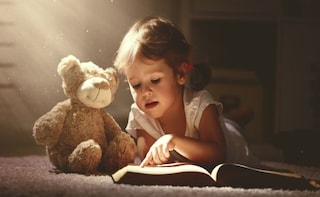No matter a girl or a boy, everyone once had a non-living stuffed friend, which was most loved by them during their childhood. It might be a bear, a doll, a puppy or any other cotton-stuffed animal, which accompanies your adorable infant everywhere. As we already know that children live in their own world filled with adventure and fantasy, and evidently feel safe and playful around their favorite toys. A recent study found that your child's stuffed companion may help induce reading habits in them. Researchers in the study said that sending kids with stuffed animals for a sleepover at the library encourages them to read, even long after the sleepover took place. This is the first time that a study proves stuffed animal sleepovers are an effective way to get children to read.
Dr. Okazaki added, "The photographs captured the children's imagination - many children believed the stuffed animals really found the books. But not every child who participated in the program began reading to the stuffed animals. There were individual differences in the results of this program. Because early childhood is the period when children begin to distinguish between fantasy and reality, their tendency to fantasize would be one factor that determines the effect of the stuffed animal sleepover."
Advertisement
Dr. Okazaki added, "The photographs captured the children's imagination - many children believed the stuffed animals really found the books. But not every child who participated in the program began reading to the stuffed animals. There were individual differences in the results of this program. Because early childhood is the period when children begin to distinguish between fantasy and reality, their tendency to fantasize would be one factor that determines the effect of the stuffed animal sleepover."
For the latest food news, health tips and recipes, like us on Facebook or follow us on Twitter and YouTube.
Advertisement
